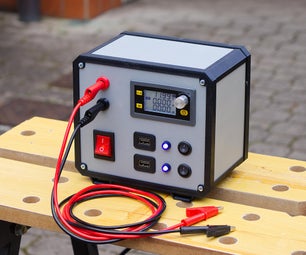Introduction: Back Woofer
How to create a simple amplifier from scavenged car stereo parts to put sound into a backpack
Step 1:
I didn’t want to spend a lot of money on parts, so budget wise most my parts were scavenged from a car stereo a friend was going to throw into the trash. I made this so I could have a more portable and convenient boom-box type back pack.
Like this scavenged TDA1558Q from that stereo. (On the heat sink)
I did something like this before by taking the set up out of a gaming chair with the speakers, inputs, and volume control, that was nice but it didn’t have the bass that I really wanted from a portable stereo. My improved version has the bass that I was looking for and has the volume control from the audio input device (i.e. Mp3, ipod, iphone, etc.).
Step 2:
Here are the components that I used:
• TDA1558Q (x1)
• 1k Resistor (x1)
• Red L.E.D. (x1)
• .1 uf Capacitor (x2)
• 2200 uf 50 V Capacitor (x1)
• RCA/Headphone cable (x1)
• Suitable Heat sink (Medium sized) (x1)
• Band-pass Filter
22 ohm 5 Watt Resistor (x1)
68 uf 35 V Capacitor (x1)
• Enclosure (x1)
• Wire
• Solder
• Proto board
• 4 ohm speakers (x2)
• 12 V Battery pack (x1)
• Suitable (durable) backpack (x1)
Tools that I used:
• Solder iron
• Drill
• Wire strippers/cutters
• Assorted drill bits
• Screwdrivers (for mounting into enclosure)
Step 3:
The TDA1558 puts out about 22 watts into 2 channels. It worked for the 6 inch woofer that I used, and it handled a mid range or tweeter as well. I incorporated a simple band-pass filter using one resistor and one capacitor for the low channel. The mid range or tweeter was un-filtered on the remaining channel.
Step 4: Schematic
This is my schematic:
Step 5:
The band pass filter was quite simple; it is used to filter out the higher frequencies to get mostly the low frequencies for the woofer. I looked up “band pass filter calculators” on the internet’s and used the closest valued components that I had. The resistor (22 ohm) and capacitor (68 uf) form a RC network that got me close to my bass goal.
This is the "Band Pass Filter" (The orange and tan components):
Step 6:
When I finished my amplifier I hooked it up to speakers and incorporated it into a backpack for easier transportation. I first put my finished amp into an enclosure and then put 2 screws through it and into a speaker enclosure (with the speaker connected). I then put the speaker enclosure (with the amp now connected and secure) and a 12 volt battery pack, into a back pack style baseball bag that I had. I didn’t secure the speaker to the bag because I didn’t want to put holes in it and it sat in there fairly secure by itself. I then ran the unfiltered audio outputs up to the top of the bag and into a tweeter.
Sadly the bag is now being used for another purpose currently so i do not have pictures of this instructable in its finished form.
Step 7:
Here is some pictures of the finished amplifier:
Step 8:
Pictures Cont.
Please feel free to comment with feedback, suggestions, or questions

Participated in the
DIY Audio

Participated in the
A/V Contest









